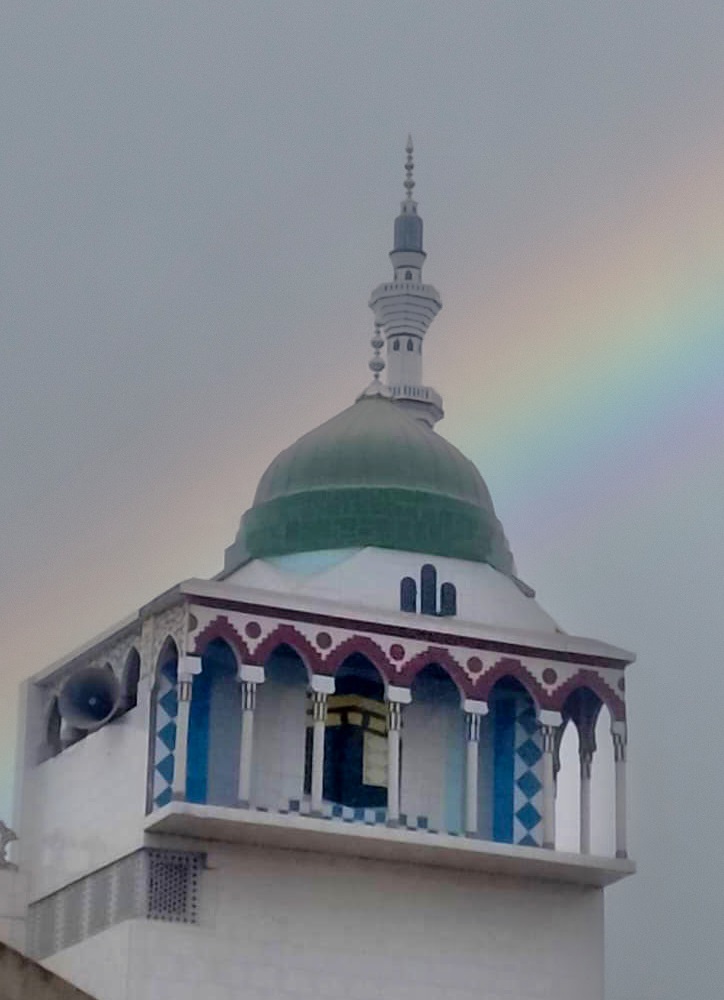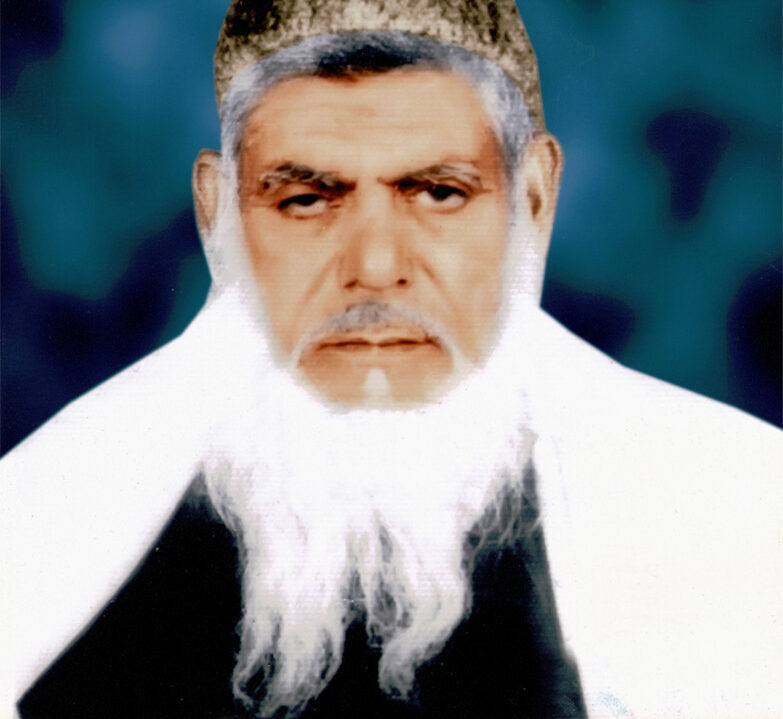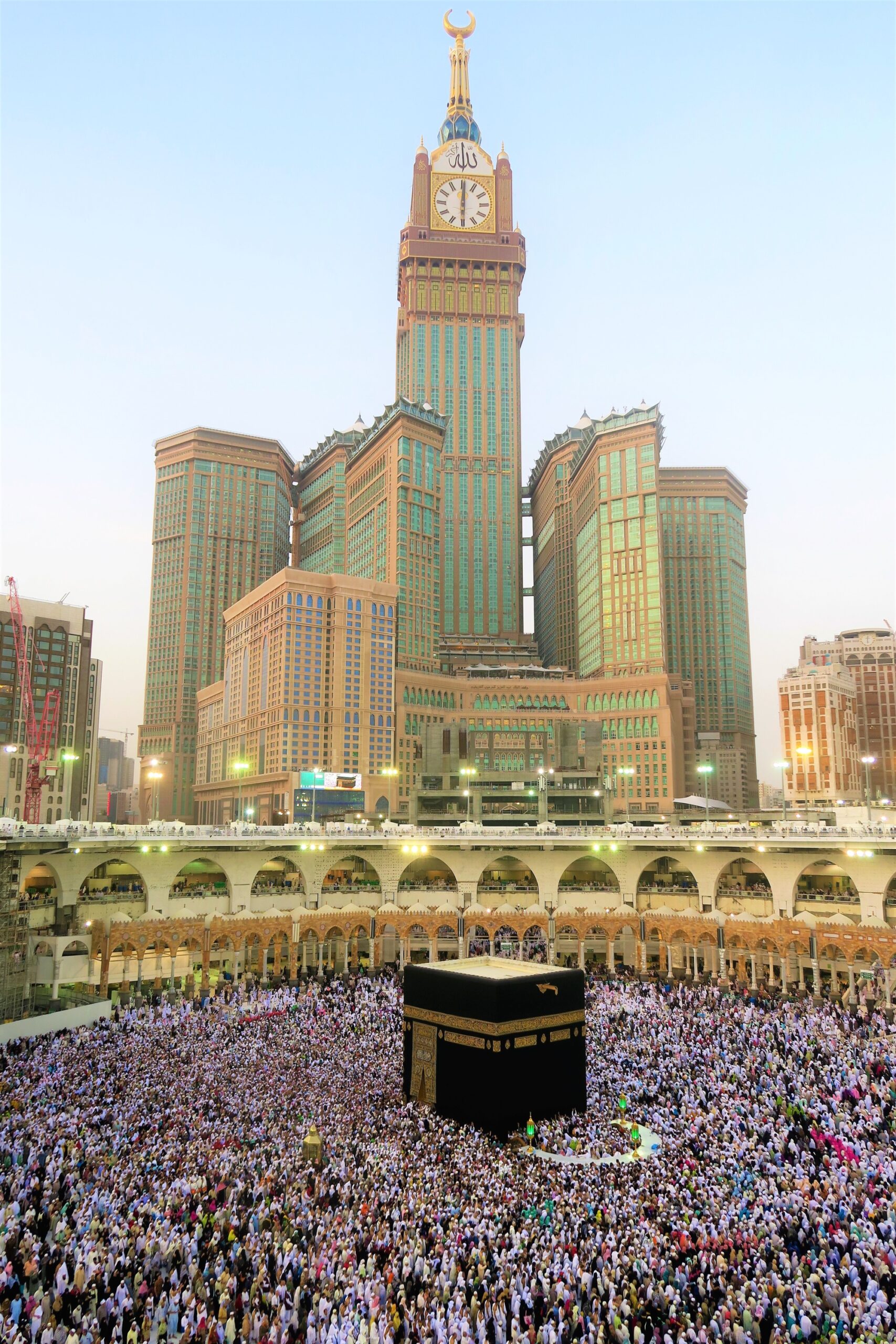




Masjid Ar-Rahmaniyah was established in 1947 by the late Islamic scholar Imam Abdul-Rahman, son of Imam Ghulam-Muhammad Al-Madani. This establishment is part of a tradition that traces back to Abraham (عليه السلام), who instructed his son Ishmael (عليه السلام) to build the House of God in Mecca, the Holy Ka’aba, and directed his son Isaac (عليه السلام) to uphold the Covenant of God by establishing the place of worship in Jerusalem, Al-Aqsa & This tradition was further continued with the establishment of the place of worship in Madina by Prophet Muhammad (ﷺ), the Prophet’s Mosque.
This Legacy is rooted in the Divine Command Associated with the Creation of Adam (آدم عليه السلام) and Eve (حواء عليها السلام), embedded in Tawheed (monotheism) and Prophethood. As stated in the Quran: “وَمَا خَلَقْتُ الْجِنَّ وَالْإِنسَ إِلَّا لِيَعْبُدُونِ” (Surah Adh-Dhariyat, 51:56), transliterated as “Wa Mā Khalaqtul Jinna Wal Insā Illā Liya’budūn,” which means, “We did not create jinn and mankind except to worship Me”.
This Verse of the Holy Qur’an is profoundly meaningful. It encapsulates the essence of God’s Attributes and their role in creation, aiming to restore the spiritual connection between the Creator and creation. This connection can be illustrated through the concept of parenthood: for instance, the nurturing bond of a mother can serve as an example of Divine Love, while the protective role of a father can represent Divine Wisdom. However, these are merely illustrative examples, as nothing can fully equate to God Almighty; His Nature is Unparalleled and Absolute, beyond any Semblance or Comparison.
“It is the Love within the Divine Will of God that led to the Creation of Humanity and other beings like the Jinn, each Endowed with Free Will. Yet, the Wisdom within God’s Will ensures that nothing is left Astray; rather, everything is Bound by Divine Order. The Act of Revelation and Divine Commands Guide beings to fulfil their Purpose in Creation, which is defined as ‘Worship.’ This state of worship aligns with one’s nature, much like how an eagle flies, a lion walks, or a seahorse swims—all following their natural instincts, bound in the Divine Orders of God. And only through such harmony can the outer state of order and the inner state of peace, as found in nature, be truly fostered by humanity to achieve a state of true serenity & calmness and a true State of Worship.”
This verse highlights the relationship between created beings with free will and the All-Encompassing Will of the Creator. It underscores how Divine Love and Divine Wisdom work together to ensure harmony and purpose in creation. It encourages humans to reflect on whether this balance is essential for remaining in a state of guidance, self-awareness, and inner peace, as opposed to a state of bewilderment.
Imam Abdul-Rahman’s family traced their lineage back to the Middle East. It is said that part of the family arrived in the Sindh province of the Indian subcontinent as part of the military expedition led by the great commander (Amir) Muḥammad ibn Al-Qāsim Al-Thaqafī, in the line of service with the Khulafa Rashideen and the Ahlul-Bayt. This included Abu Bakr As-Siddiq, the first caliph (رض), and Ali Ibn Abi Talib, the fourth caliph (رض), both of whom were close companions of the Prophet Muhammad (ﷺ).
In the context of the understanding of Ahlul-Bayt, the Khulafa Rashideen are highly esteemed. The Prophet Muhammad (ﷺ) affirmed Abu Bakr’s significant role, stating, “Follow those who come after me: Abu Bakr (رض) and Umar (رض),” highlighting their importance as leaders in the early Islamic state. Additionally, the Hadith “Man Kuntu Mawlahu Fa Aliyun Mawlahu” (Whoever considers me his Mawla [guardian/master], then Ali is his Mawla [guardian/master]) emphasizes Ali Ibn Abi Talib’s role as a key figure in spiritual leadership.
Commander (Amir) Muḥammad Ibn Al-Qasim Al-Thaqafī later faced persecution under the Umayyad Governor of Iraq, Al-Hajjaj Ibn Yusuf. This persecution was likely due to Amir Muḥammad’s rejection of Al-Hajjaj’s oppressive behaviors and his alignment with the principles of the Ahlul-Bayt. Al-Hajjaj Ibn Yusuf was particularly provoked by Amir Muḥammad Bin Al-Qasim’s alignment, leading him to oppress not only Amir Muḥammad Bin Al-Qasim but also others who shared similar values. Among those affected were Abdullah Ibn Zubair Ibn Awwam (رضي الله عنه), the grandson of the first Caliph Abu Bakr (رضي الله عنه), and Imam Saeed Ibn Jubayr (رضي الله عنه), a renowned scholar of Islamic Law.
According to historians, the army for the expedition was primarily assembled from Northern Arabia and the Levant, with some claiming lineage tracing to Areeha (Jericho), which is located in the Jordan Valley, between the Jordan River to the east and Jerusalem to the west. At a time when the Israelites and Ishmaelites coexisted harmoniously and intermarried, the aim was to maintain the security and safety of the Holy Land of Jerusalem, ensuring the protection of pilgrims from the Abrahamic faiths—Judaism, Christianity, and Islam—traveling to the sacred sites.
It is documented that the armies arriving from Areeha were composed of Muslims, many of whom saw their entry into Islam as a natural progression, coming from Jewish and Christian backgrounds. This was akin to the experience of the Jewish people when a prophet appeared among them before Christ—not as the Messiah, but as one who performed miracles that led the people to recognize his divine message. Just as they had recognized earlier prophets through signs and miracles, the followers of Islam saw their acceptance of the faith as a continuation of their long-standing spiritual heritage.
It is important to note that the recognition was based on scriptural reasoning, which spoke of the coming of another prophet, whose arrival would be marked by signs and confirmations. Like many before them, scholars emerging from the same monastic traditions and religious communities found themselves at a crossroads, where differing interpretations and opinions arose. Some would choose to follow one path or opinion, while others, moved by the same divine signs, would embrace the new message and the teachings of Islam as the fulfillment of that long-anticipated prophecy. Thus, their acceptance of Islam was not an abrupt departure from their faiths but rather a deepening of their spiritual understanding, built on the foundation of their past beliefs and the signs that confirmed the truth of the new message.
As such among them were individuals of Israeli descent, with ancestral ties tracing back to the House of Amram (Imran AS), a prestigious priestly lineage within Jewish families, as well as descendants of saintly Christian families, including the Apostles, those who had received the message directly from Christ, Isa Ibn Maryam (Jesus, son of Mary), and spread his teachings to many parts of the world. These individuals carried with them the message of Islam and became an integral part of the region’s cultural and societal fabric, contributing to the development of the Indian subcontinent’s diverse and rich heritage. As such, you will find among these families members who demonstrate the traits of the Jewish tribes and people, preserving aspects of their ancestral traditions and characteristics even as they embraced new faiths and integrated into the wider society.
In the spirit of such continuity the mosque was established during the era of the Dominion of Pakistan, a precursor to the modern-day Islamic Republic of Pakistan. This period marked a profound historical and cultural transformation, culminating in the formation of the Federal Shariat Court. The Imam’s family played a key role in this significant development, contributing not only to the nation’s legal and religious landscape but also in military and scholarly capacities, thereby shaping the evolving identity of the country.
These mosques were established after making Hijrah from the district of Jalandhar in the Republic of India to the district of Nanak Sahib in the Islamic Republic of Pakistan during the partition of British India. The mosques were established as part of the continuity of the mosques left behind in British India. Imam Abdul-Rahman’s family suffered during the partition. Just like most families of the Indian Subcontinent suffered from the oppression of the British Crown & British Establishments that were particularly directed towards Islam & Muslims. Imam Abdul-Rahman thanked Allah (ﷻ) for the home that Allah (ﷻ) blessed his family & suffering Muslims of British India with a home in the Islamic Republic of Pakistan.
Imam Abdul-Rahman bin Ghulam-Muhammad was a renowned scholar of Fiqh who studied spirituality from his father Imam Ghulam-Muhammad. Allah (ﷻ) blessed Imam Abdul-Rahman to meet His Majesty King Abdulaziz bin Abdul-Rahman Al Saud inside the Holy Ka’aba during Hajj. His Majesty King Abdulaziz bin Abdul-Rahman Al Saud took his own Bisht off from his shoulders (traditional Arab Royal Cloak/Cape) and put it around the shoulders of Imam Abdul-Rahman giving it as a gift from him & his royal family to the Imam & his family.
It is important to note that while the concept of the “King’s Bisht” may carry cultural or material significance, it has no bearing on the recognition of the Imamat in the sense of their names being preserved alongside figures such as Imam Muhammad ibn Ismail Al-Bukhari (رحمه الله), Imam Abu Isa Muhammad ibn Isa At-Tirmidhi (رحمه الله), Imam Abu Hanifa (رحمه الله), Imam Malik ibn Anas (رحمه الله), Imam Muhammad ibn Idris Ash-Shafi’i (رحمه الله), Imam Ja’far ibn Muhammad (رحمه الله), and others.
Traditionally, the Hadith of Prophet Muhammad (ﷺ) regarding the Ahlul-Bayt is considered of primary importance when discussing the Imamat. One such Hadith is the Hadith of the Cloak, in which the Prophet Muhammad (ﷺ) covered the Ahlul-Bayt with his cloak while saying: “O Allah, these are my family, so remove impurity from them and purify them thoroughly.” The individuals present included his daughter Fatimah (فاطمة عليها السلام), his cousin and son-in-law Ali (علي عليه السلام), and their sons Hasan (الحسن عليه السلام) and Husayn (الحسين عليه السلام). This Hadith is recorded in Sunni traditions, including Sahih Muslim and Sahih al-Bukhari. It is affirmed by the Quranic verse: “Allah intends only to remove the uncleanness from you, O people of the House, and to purify you thoroughly” (Surah Al-Ahzab, 33:33). This Hadith underscores the spiritual and theological significance of the Ahlul-Bayt in Islam, highlighting their honored status within the faith.
In this sense, It is not the cloak of King Abdul-Aziz but the cloak of the Ahlul-Bayt that carries the spiritual significance associated with the Imams, or Imamat. In this context, the descendants of Prophet Muhammad (ﷺ) in Pakistan, from the lineage of Imam Ali ibn Muhammad Al-Hady (عليه السلام), recognized in Imam Abdul-Qayyum (رحمه الله), the son of Imam Abdur-Rahman, someone who manifested the closest embodiment of the Imams of the Ahlul-Bayt, according to what they witnessed in Pakistan. Similarly, the Ahlul-Bayt of Iran, from the lineage of Imam Musa ibn Ja’far Al-Kazim (عليه السلام), saw something akin to this in Imam Ruhollah Mousavi Al-Khomeini (رحمه الله).
Nevertheless, It said both the Imam & King washed the the Holy Ka’aba and Maqam-e-Ibrahim (مَقَام إِبْرَاهِيْم – Station of Abraham) together to honour our Great Father Abraham as in Ibrahim (ﷺ). His Majesty King Abdulaziz bin Abdul-Rahman Al Saud and Imam Abdul-Rahman bin Ghulam-Muhammad exchanged books and shared a friendship that lasted till they passed away.
The Mosques were later looked after by the son of Imam Abdul-Rahman, who was a distinguished scholar of hadith, Imam & Sheikh Abdul-Qayyum bin Abdul-Rahman and was recognised as Sheikh-ul-Hadith.
Imam Abdul-Qayyum bin Abdul-Rahman looked after the mosque till he passed away in the Holy City of Mecca, Saudi Arabia during Hajj. Imam Abdul-Qayyum was blessed with his Janaza being held at the Holy Ka’aba & led by the Imam of the Holy Ka’aba. Imam Abdul-Qayyum was laid to rest in the famous Cemetery in the Holy City of Mecca, walking distance from the Holy Ka’aba, known as Janat-ul-Mu’allah ( جَنَّة ٱلْمُعَلَّاة – The Most Exalted Paradise). The Imam Late Imam Abdul-Qayyum was laid close to the Companion of the Prophet Muhammad (ﷺ), Abd Allah ibn al-Zubayr ibn al-Awwam (رض) in Janat-ul-Mu’allah. This Cemetery Janat-ul-Mu’allah has the honour of hosting the grave of our Dearest Mother & Wife of our Beloved Prophet Muhammad (ﷺ) Khadija bint Khuwaylid (رض) and their son Qasim (رض) bin Muhammad (ﷺ) along with the nobles of the Arab Hashemite family.
The connection with The Kingdom of Saudi Arabia was maintained by the late Imam’s family at all levels. This includes not only religious but in other remits such as the military and education. As one of the sons of the Imam who served in the Pakistan Army, also served in the Saudi Arabian Army, officially the Royal Saudi Land Forces as part of the United Nations-led military mission.
Two of the sons of the Late Imam, “Muhammad Tayyab & Abdul-Wahab”, who served in the Pakistan Army as officers, gave their Patronages to the Three Mosques Ar-Rahmaniyah.
Since the Late Imam Abdul-Qayyum passed away, his family, friends and community established three mosques. All three mosques were established on the late Imam Abdul-Qayyum’s personal land that was dedicated to the mosques by the late Imam Abdul-Qayyum himself. This decision was made by the family collectively, who converted the mosques into public endowments and waqf in honour of their late father’s wishes.
The trust is currently being Islamically guided by Imam Mubashir Ahmed Al-Madani. Imam Mubashir Ahmed al-Madani graduated from the Islamic University of Madina and Darul-Ulooms in Pakistan. Imam Mubashir Ahmed Al-Madani is the son of Imam Abdul-Qayyum and studied hadith from him.
The trust is currently represented in the Middle East by Imam Syed Asadullah Bin Abdul-Hannan Naqvi Al-Hady, who is married to the granddaughter of the late Imam Abdul-Qayyum. Imam Syed Asadullah bin Abdul-Hannan Al-Naqvi is an alumnus of the Islamic University of Madinah and various Darul-Ulooms in Pakistan. He is the son of the great Islamic scholar, the late Imam Syed Abdul-Hannan Bin Hameed-ul-Hassan Naqvi Al-Hady, and also plays a significant role within the trust. Imam Syed Abdul-Hannan Naqvi Al-Hady later established several mosques in the Islamic Republic of Pakistan, in collaboration with my well known families such as the Al-Thani the Ruling Family of the Islamic State of Qatar & the Al-Saud the Ruling Family of the Islamic Kingdom of Saudi Arabia.
The trust is being managed by Muhammad Amir, the youngest son of Imam Abdul-Qayyum. The Khateeb of the mosques is Hafiz Abubakar bin Muhammad Amir the grandson of the late Iman Abdul-Qayyum. Hafiz Abubakar is currently studying at Darul-Uloom in Pakistan and has Ijaza in the Quran going back to the great Mufasir and Imam, the companion of the Prophet Muhammad (ﷺ), ʿAbd Allāh ibn Masʿūd (رض).
The Caretaker & Khadim, of the three Ar-Rahmaniyah Mosques, is Brother Fahd Ali Bin Muhammad Tayyab. Br Fahd studied Islam, Inter-faith, Physics, Philosophy, Arabic & Hebrew in many countries such as Egypt, Saudi Arabia, London, the United States, Germany, Qatar, China, India and Kuwait. Br Fahd is the grandson of The Late Sheikh-ul-Hadith Imam Abdul-Qayyum bin Abdul-Rahman Al-Makki (رحمه الله).
Br Fahd jointly graduated in physics with philosophy from one of the colleges part of the University of London & The University of Chicago from the USA, then a Postgraduate in Education from the University of Nottingham, then courses in Islamic Aqeeda (Creed) from the University of Kuwait, later was commissioned into the military. Br Fahd studied Shia & Sunni aspects of Islamic Law & was instrumental in forming an academic connection between The Islamic College, a London-based academic institution specialising in Islamic Studies that worked under the guide of the Late Ayatollah Syed Fadhil Ayatollah Milani, and the Al-Thani Ruling Family of the Islamic State of Qatar.
Br Fahd is currently looking to engage in a research program between the University of Chicago & the University of Princeton to be presented at the Institute for Advanced Study based at 1 Einstein Drive, Princeton, United States in collaboration with the Office for Military-Affiliated Communities at The University of Chicago.

“Allah says: ‘I am as My servant thinks of Me, and I am with him when he makes remembrance (dhikr) of Me. If he makes remembrance of Me to himself, I make remembrance of him to Myself. If he makes remembrance of Me in a gathering, I make remembrance of him in a gathering better than it.’”

“If a person relieves a Muslim of his trouble, Allah will relieve him of his troubles on the Day of Resurrection”

Ibn Al-Qayyim ![]() said, “Faith-inspired insight is caused by the light that Allaah The Almighty casts in the heart of His slave, whereby he distinguishes between truth and falsehood, what exists and what is nonexistent, and those who are truthful and those who are liars. This insight depends on the person’s strength of faith – Abu Bakr
said, “Faith-inspired insight is caused by the light that Allaah The Almighty casts in the heart of His slave, whereby he distinguishes between truth and falsehood, what exists and what is nonexistent, and those who are truthful and those who are liars. This insight depends on the person’s strength of faith – Abu Bakr ![]() was the sharpest of this Ummah (Muslim nation) in insight.”
was the sharpest of this Ummah (Muslim nation) in insight.”
| Islamabad, Pakistan Tuesday, 13th January, 2026 24th Rajab, 1447 | |
| Salat | Time |
| Fajr | 6:45 AM |
| Sunrise | 8:13 AM |
| Zuhr | 1:16 PM |
| Asr | 4:01 PM |
| Magrib | 6:20 PM |
| Isha | 7:48 PM |
Jointly Designed by
Bilal & Garav
& sponsored by
FT Capital ltd
